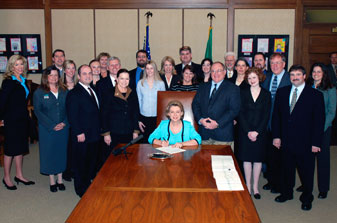Collaborative Efforts Yield Successes in the Policy Arena
Legislative and regulatory achievements establish balanced forest policies and encourage investment
The WFPA model of working collaboratively with stakeholders was a
guiding force this legislative session and enabled us to achieve
passage of significant legislation during a busy session with a strong
Democratic majority in both houses. The 2007 session saw almost 3,500
bills introduced, and the passage of a $33.4 billion budget. The 2006
elections gave Democrats control of the House of Representatives,
Senate, and the Governor’s Office. The democratic majority is 63-35
in the House and 32-17 in the Senate. This is the largest Senate
majority in more than 40 years.
Timber Tax Bill and Forest Health Bill Pass Unanimously in the State Legislature
Our Timber Tax Bill
(House Bill 1513) passed both houses of the Legislature unanimously,
and Governor Gregoire signed it into law on April 17. A unanimous vote
by the Legislature and an early signature by the Governor signals
strong support for our industry.
WFPA staff and other stakeholders joined Governor Gregoire to
celebrate the signing of the Timber Tax Bill on April 17, 2007.

The Timber Tax Bill provided fixes to technical errors and unintended
consequences of Senate Bill 6874, which was passed during the 2006
Legislature and was intended to provide a reduction to the B&O Tax
for the forest products industry. House Bill 1513 also includes a
small measure of relief to family forest landowners and prevents Real
Estate Excise Tax issues.
WFPA was also successful in negotiating the Forest Health bill
(Senate Bill 6141), which gives the Department of Natural
Resources (DNR) the lead role in developing a comprehensive forest
health program for the state. The law creates a three-tiered system
for DNR to address emerging issues with forest health. This bill
also passed unanimously in the Legislature.
Desired Future Conditions Proposal Accepted as a Second Alternative
After the Forests & Fish Policy committee reached cautious
agreement on the substance of a WFPA sponsored Desired Future
Conditions (DFC) rule proposal, the Washington State Forest Practices
Board accepted the proposal as a second alternative for the
rule change.
The WFPA proposal meets the DFC target established by adaptive
management science at a significantly lower cost to landowners than
the original staff proposal. It also includes a simplified commercial
thinning standard that is designed to attract small and large
landowners to this option in the riparian protection rules.
Voluntary Support for Protecting the Taylor’s Checkerspot Butterfly Habitat
In a small, but significant action the Board agreed in September to a
voluntary approach for protecting occupied Taylor’s Checkerspot
Butterfly habitat. The alternative would have been to designate state
critical habitat triggering Class IV Special status for forests around
butterfly sites.
WFPA was able to work cooperatively with the Department of Fish and
Wildlife and The Nature Conservancy getting their support for the
voluntary recommendation. The key was convincing them that a
cooperative planning approach rather than further restrictive
regulation would yield greater opportunities for increasing the
habitat needed for species recovery.
Taylor’s Checkerspot Butterfly





